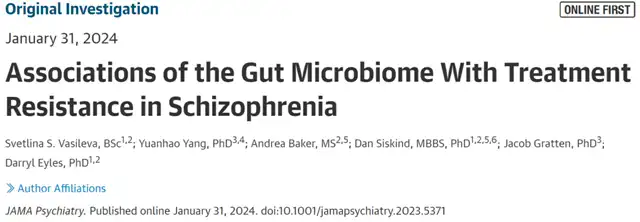Treatment Efficacy for Schizophrenia Also Depends on Gut Microbiota!
- Normal Liver Cells Found to Promote Cancer Metastasis to the Liver
- Nearly 80% Complete Remission: Breakthrough in ADC Anti-Tumor Treatment
- Vaccination Against Common Diseases May Prevent Dementia!
- New Alzheimer’s Disease (AD) Diagnosis and Staging Criteria
- Breakthrough in Alzheimer’s Disease: New Nasal Spray Halts Cognitive Decline by Targeting Toxic Protein
- Can the Tap Water at the Paris Olympics be Drunk Directly?
Treatment Efficacy for Schizophrenia Also Depends on Gut Microbiota!
- Should China be held legally responsible for the US’s $18 trillion COVID losses?
- CT Radiation Exposure Linked to Blood Cancer in Children and Adolescents
- FDA has mandated a top-level black box warning for all marketed CAR-T therapies
- Can people with high blood pressure eat peanuts?
- What is the difference between dopamine and dobutamine?
- How long can the patient live after heart stent surgery?
Treatment Efficacy for Schizophrenia Also Depends on Gut Microbiota!
Schizophrenia is a complex mental disorder affecting the quality of life and social functioning of millions worldwide. Despite significant advancements in treatment methods over the past few decades, around 30% of patients still exhibit treatment resistance, where symptoms remain unimproved even after receiving adequate doses and durations of two or more typical or atypical antipsychotic medications.
Recently, findings published in the JAMA Psychiatry journal by Darryl Eyles and colleagues from the University of Queensland in Australia shed light on a new aspect. Their research suggests that the gut microbiota of schizophrenia patients significantly differs in composition and function compared to healthy controls, with a decrease in species richness. Moreover, certain microbial species associated with schizophrenia are closely linked to treatment resistance.
These results indicate that modulating the gut microbiota could potentially improve the prognosis of treatment-resistant schizophrenia patients. Additionally, the study identifies differences in certain gut microbial species and metabolic pathways, offering potential new directions for treatment.

The study, which included 97 participants, 74% male, with an average age of 40.4 years and an average body mass index (BMI) of 32.8, conducted comprehensive analyses of fecal samples using metagenomics. They investigated whether schizophrenia, treatment resistance, clozapine response, and treatment-related adverse effects (including metabolic syndrome and constipation) were associated with the composition and function of the gut microbiota.
After adjusting for factors such as age, gender, BMI, stool status, diet, and physical activity, researchers provided evidence suggesting that, consistent with previous findings, there are significant differences in the gut microbiota between healthy participants and schizophrenia patients, with decreased species richness.
Furthermore, the study revealed significant differences in the gut microbiota composition between schizophrenia patients with treatment resistance, particularly those treated with clozapine, compared to those who responded well to treatment.
The use of common non-antipsychotic medications such as metformin and proton pump inhibitors, as well as levels of certain gut bacterial enzymes, were also correlated with specific gut microbes.
Constipation and metabolic syndrome are common adverse reactions to antipsychotic medications, often associated with the gut microbiota. However, unlike previous studies, this research did not find a significant association between metabolic syndrome, constipation, and gut microbiota characteristics; meanwhile, the duration of the illness was unrelated to gut microbiota features.
These associations were further supported by additional analysis of differences in microbial species and metabolic pathways.
Regarding microbial abundance, researchers identified 19 gut microbial species with differential abundance between healthy participants and schizophrenia patients, with 15 showing increased abundance in schizophrenia patients. Regarding differences in metabolic pathways, researchers identified 162 pathways with differential abundance out of 765, with 158 showing higher abundance in schizophrenia patients.
Subsequently, they identified 13 gut microbial species associated with treatment resistance in schizophrenia. Interestingly, five gut microbial species positively associated with treatment resistance were also positively associated with schizophrenia onset. Similarly, in the analysis of metabolic pathways, 148 pathways showed differential expression positively correlated with both schizophrenia onset and treatment resistance.
Although researchers observed differences in gut microbiota composition associated with treatment resistance and clozapine response, causality could not be determined, highlighting the need for future studies to better understand the dynamic relationship between changes in gut microbiota and treatment resistance in schizophrenia.
With a deeper understanding of the role of gut microbiota in schizophrenia, there is hope for more personalized and effective treatment approaches for schizophrenia patients, with greater consideration of medication dosages during treatment.
Treatment Efficacy for Schizophrenia Also Depends on Gut Microbiota!
References:
[1]Siskind D, Orr S, Sinha S, et al. Rates of treatment-resistant schizophrenia from first-episode cohorts: systematic review and meta-analysis. Br J Psychiatry. 2022;220(3):115-120. doi:10.1192/bjp.2021.61
[2]https://jamanetwork.com/journals/jamapsychiatry/article-abstract/2814638
(source:internet, reference only)
Disclaimer of medicaltrend.org
Important Note: The information provided is for informational purposes only and should not be considered as medical advice.



